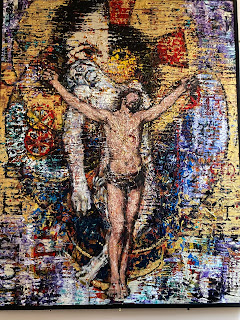Changing the Conversation on COVID
“So let’s strive for the things that bring peace and the things that build each other up.”
(Romans 14:19
“You have been called to freedom, brothers and sisters; only don’t let your freedom be an opportunity to indulge your selfish impulses, but serve each other through love. All the law has been fulfilled in a single statement: Love your neighbor as you love yourself.”
(Galatians 5:13-14)
Data indicates that COVID numbers are on the rise again as the dangerous Delta variant becomes the predominate strain. As we continue to try and live faithfully into these days, what is asked of those who are followers of Jesus?
A short time ago, I was checking out at Publix when I suddenly heard a loud angry voice proclaiming, “What’s the matter with you people! Your being duped, you are stupid…I don’t have to wear a mask…you don’t have to wear a mask!” There were also a few expletives thrown in for good measure. He was yelling at others in the grocery store who happened to be wearing a face mask. I was one of them.
It angers me that our national conversation on safe practices during COVID has become hijacked by those wanting to use COVID precautions, safety protocols, and vaccines for political identity or loyalty markers. Some have even refused a vaccine out of fear that it might give a political opponent credibility. Keeping people healthy and safe, both conservative and progressive persons, should be a priority regardless of political affiliation. It should be an area where people of diverse views can find common ground.
For some, though, safety practices, like wearing a face mask, are an intrusion on personal freedoms. I get it, wearing a mask is uncomfortable and hot. I can’t wait to reach the point where it is safe, for self and others, to go to public places without having to worry about a face mask. Still, there is more at stake than personal liberty and comfort and we need to change the conversation as it relates to COVID and how we as followers of Jesus are called to respond.
The Apostle Paul is a helpful guide for us in this highly charged political climate. Paul knew issues in his day that held personal freedoms and communal responsibility in tension. In his letters, Paul addressed questions such as, “can a follower of Jesus eat meat sacrificed at a pagan temple?” or “if salvation is of Christ and not the Law, can a person do whatever they want?”. These issues may be different than ours, but the tension between personal freedom and communal obligation is similar.
For Paul, personal liberties were not the priority with the freedom of Christ. Rather, it was love for God and others. While individuals could do certain things, like eating meat from a pagan temple, without offending God, one must still consider if it causes harm to others. Rather, than personal freedom and preference, Paul argues, followers of Jesus should strive for what builds others up. In essence, what is most caring towards other people. Similarly, even though Paul understands salvation to come through faith in Christ, that doesn’t mean one is free to disregard the basic spirit and principle behind the Jewish Law, love of neighbor. All the law can be captured in that one phrase, Paul writes, love your neighbor as yourself.
If Paul were to message us today, I believe he would instruct the people of God to change the conversation from, “What is best for me?” to “What can I do to be caring and considerate towards others, particularly the vulnerable?” These are the guidelines for followers of Jesus in these strange days of COVID. How can we live in a way that has the most benefit for others, not just self?
In this spirit, the next time your mask feels hot and scratchy, or you feel frustrated about even having to wear it, I invite you to change the conversation in your mind. See it as a way to practice love of God and neighbor, a way to show Christian hospitality and care to others. I also invite you to see vaccinations in the same light. A vaccine is more than a way to care for self, it helps keep others safe, too.
Of course, we all must choose. That is the thing about freedom, we make the decision on who we will be, for good or bad. Paul seemed to understand that and knew we could either become focused on personal wants or we could live in a way that was a blessing to others. May we choose the way of blessing, the way of love for others. May we change the conversation.



Comments
Post a Comment